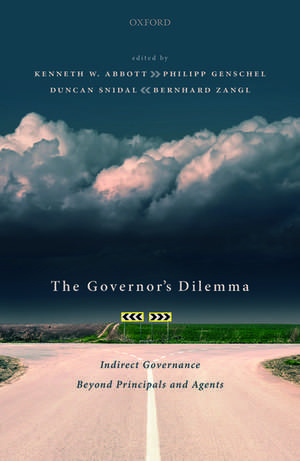The Governor's Dilemma: Indirect Governance Beyond Principals and Agents
Editat de Kenneth W. Abbott, Bernhard Zangl, Duncan Snidal, Philipp Genschelen Limba Engleză Paperback – 11 mar 2020
| Toate formatele și edițiile | Preț | Express |
|---|---|---|
| Paperback (1) | 237.46 lei 10-16 zile | |
| OUP OXFORD – 11 mar 2020 | 237.46 lei 10-16 zile | |
| Hardback (1) | 614.67 lei 31-37 zile | |
| OUP OXFORD – 11 mar 2020 | 614.67 lei 31-37 zile |
Preț: 237.46 lei
Preț vechi: 253.11 lei
-6% Nou
Puncte Express: 356
Preț estimativ în valută:
45.45€ • 49.39$ • 38.20£
45.45€ • 49.39$ • 38.20£
Carte disponibilă
Livrare economică 20-26 martie
Preluare comenzi: 021 569.72.76
Specificații
ISBN-13: 9780198855064
ISBN-10: 0198855060
Pagini: 320
Dimensiuni: 152 x 229 x 17 mm
Greutate: 0.47 kg
Editura: OUP OXFORD
Colecția OUP Oxford
Locul publicării:Oxford, United Kingdom
ISBN-10: 0198855060
Pagini: 320
Dimensiuni: 152 x 229 x 17 mm
Greutate: 0.47 kg
Editura: OUP OXFORD
Colecția OUP Oxford
Locul publicării:Oxford, United Kingdom
Recenzii
Overall, this volume not only advances our theoretical understanding of modes of governance and governance dynamics by putting theoretical "meat" behind when to expect delegation, trusteeship, cooptation, or orchestration to occur but also puts its fingers on crucial political dynamics that occur across the globe that are rooted in the innovative insight that is the governor's dilemma.
The Governor's Dilemma successfully combines cuttingedge theory with deeply sourced empirical studies to inaugurate new avenues of research. It will be an indispensable resource for future studies of indirect governance,...The Governor's Dilemma deserves to be read widely in all corners of political science.
The Governor's Dilemma successfully combines cuttingedge theory with deeply sourced empirical studies to inaugurate new avenues of research. It will be an indispensable resource for future studies of indirect governance,...The Governor's Dilemma deserves to be read widely in all corners of political science.
Notă biografică
Kenneth W. Abbott is Jack E. Brown Chair in Law and Professor of Global Studies Emeritus at Arizona State University. His research focuses on the interdisciplinary study of international institutions, international law, and international relations. He studies public and private governance in fields including environmental protection and he held the Elizabeth Froehling Horner Chair at Northwestern University School of Law, and served as director of Northwestern's Center for International and Comparative Studies. He is a Lead Faculty member of the Earth System Governance Project, and a member of the editorial boards of International Theory, Regulation & Governance, and Journal of International Economic Law.Bernhard Zangl is a Professor of Global Governance at LMU Munich's Geschwister-Scholl-Institute of Political Science. His research focuses on the role of international institutions in global governance. He is a co-editor of International Organizations as Orchestrators. His research was published in the Annual Review of Political Science, British Journal of Political Science, European Journal of International Relations, International Studies Quarterly, Review of International Organizations, Journal of Common Market Studies among others. He studied in Tübingen and Pisa, holds a PhD from the Universität Bremen, and has held visiting positions at the European University Institute, Harvard University, Northwestern University, and the Berlin Social Science Center.Duncan Snidal is Professor of International Relations at the University of Oxford and a fellow of both Nuffield College and the British Academy; he previously taught at the University of Chicago. His research focuses on problems of international cooperation and institutions with an emphasis on institutional design. He is co-editor of International Organizations as Orchestrators and co-author of Institutional Choice and Global Commerce. Recent articles have appeared in International Organization, British Journal of Political Science, Journal of Conflict Resolution and the Annals of the American Academy. He is cofounder of the journal International Theory and general co-editor of a forthcoming twelve volume set of Oxford Handbooks of International Relations.Philipp Genschel is Professor of Comparative and European Public Policy at the European University Institute in Florence; he is on leave from Jacobs University Bremen. His research focuses on the political economy of governance at the national, the European and the international level. He is co-editor of Beyond the Regulatory Polity? The European Integration of Core State Powers (OUP 2014), of International Organizations as Orchestrators (CUP 2015), and of the Tax Introduction Database. Recent articles have appeared in British Journal of Political Science, Journal of Common Market Studies, Review of International Political Economy and Review of International Organization.
